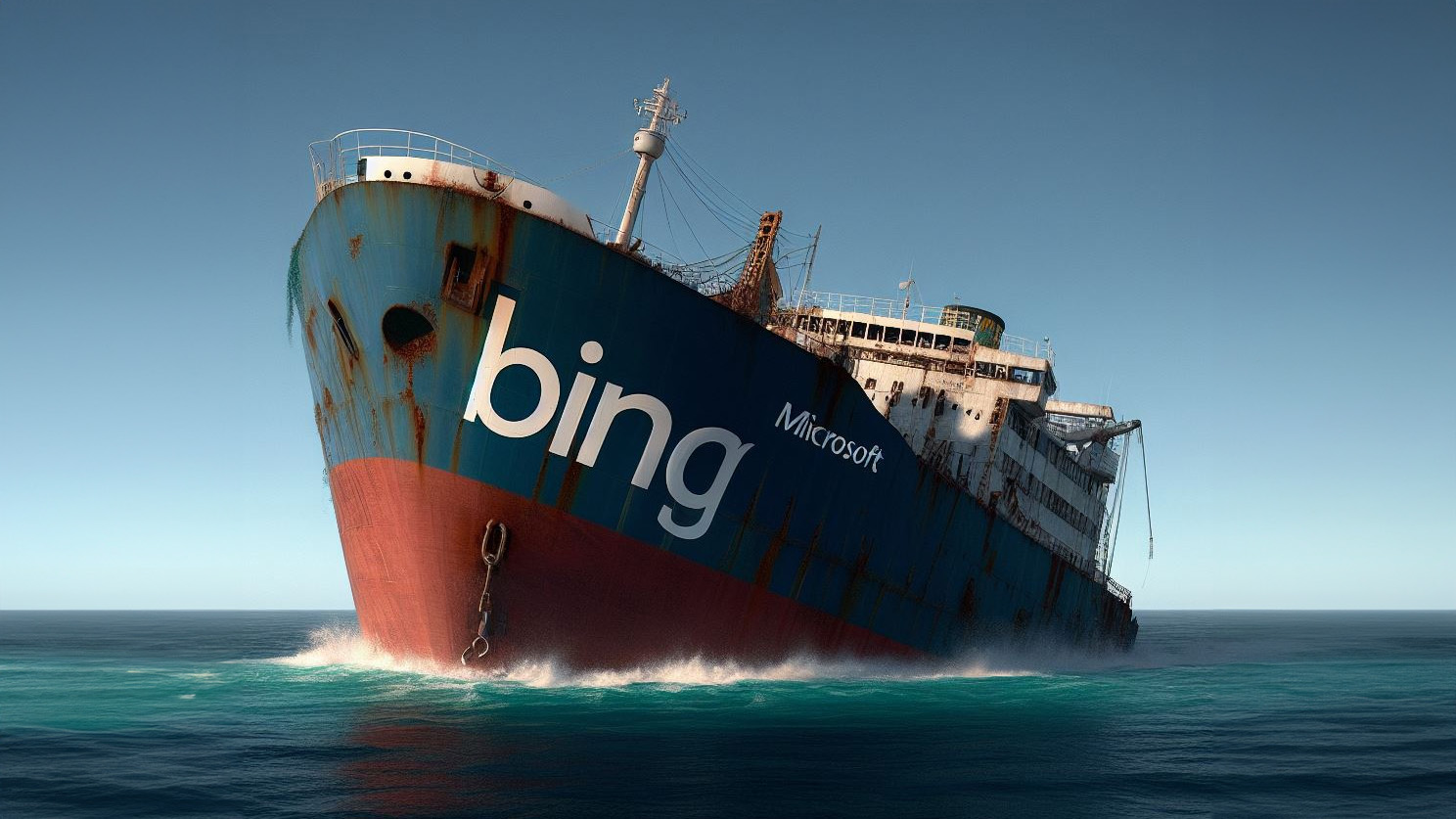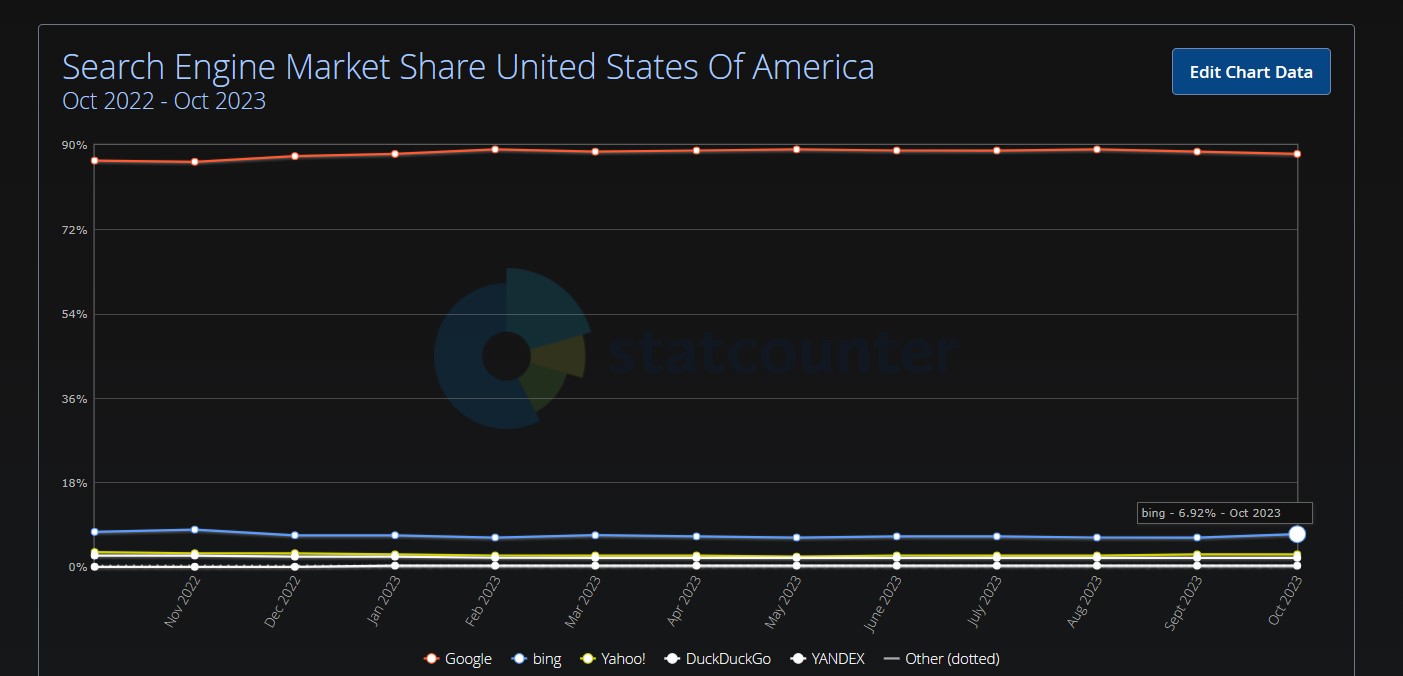Despite its big OpenAI push, Microsoft's Bing search market share decreases year-over-year
I guess there are some things ChatGPT can't help with.

All the latest news, reviews, and guides for Windows and Xbox diehards.
You are now subscribed
Your newsletter sign-up was successful
What you need to know
- Bing is the biggest search competitor next to Google, despite having only roughly 7% of the market.
- This past year, Microsoft's big Bing partnership with OpenAI spooked Google investors to the point its stock price decreased.
- Despite the hype over the past year, Bing's search market share actually decreased year over year, according to share tracker StatCounter.
I am an unashamed Bing user (okay, maybe slightly ashamed) — those Microsoft Rewards are just so damn good. Sadly for Microsoft, though, the general populace doesn't seem to care.
Microsoft created something of a hype train at the start of 2023, as its partnership with OpenAI began to bear fruit. Microsoft has baked ChatGPT's human-like response chatbot into virtually all its products, with code support AI in Github to generative pictures in Microsoft Paint. The tip of the hype train revolved around Bing, however, which is Microsoft's under-loved and underutilized search platform.
Using Bing and Windows Copilot (which is essentially just Bing), you can ask it to steal repurpose content from across the web in a single place. By stealing repurposing content from websites like Windows Central, Bing promised to save users time by eliminating the need to actually click through and support the websites Bing is stealing repurposing content from. However, the promise hasn't really lived up to reality. Bing is oftentimes just slower than simply clicking through to the website, and has a tendency to either censor or garble the information it's trying to steal repurpose. Too often I've found myself simply giving up on Bing, since it's often just quicker to go to the source. Perhaps other users are feeling similarly.
According to search volume tracker Stat Counter, Bing's market share actually decreased half a percent year-over-year in the United States, from 7.4% to 6.9%, Google's share increased to 88% up from 86.7% last year, taking a little bit of search volume from virtually every other noticeable player. Microsoft Edge stole 1% of Google's Chrome web browser share, however, although it's still a drop in the ocean at just under 5.5% market share. So it's not all bad news, right?!
These stats are relatively tiny and are likely within the margins for error, but so far, it doesn't seem like OpenAI is proving the disruptor Microsoft likely hoped it would be. It is, however, costing hundreds of thousands of dollars per day to run. So, there is that.
Does Bing have a prayer?
The reality is that you could call these stats effectively flat, but to actually lose market share despite the massive ChatGPT hype injection isn't exactly encouraging. You could say it's still pretty early days in the world of generative AI, however. Bing and Windows Copilot have their uses, even if web search isn't necessarily one of them.
Related: How to get started with Bing Chat
All the latest news, reviews, and guides for Windows and Xbox diehards.
Google is currently embroiled in a massive anti-trust case in the United States, where regulators are arguing that it has abused its search monopoly to favor its own products, among other things. Microsoft has testified in the case, which saw CEO Satya Nadella effectively concede it was impossible to dent Google's market share. Google pays companies like Firefox, Apple, and Samsung billions of dollars to maintain its "default search" position on pre-installed browsers and apps, making it difficult for competitors to acquire the data necessary to improve search result relevancy. It's certainly possible that this court case could end up having more benefits for Bing and search competition than generative AI ever could, but the US FTC doesn't enjoy the kind of legislative powers that EU or UK regulators do.
In any case, with Google's own "Bard" AI catching up to Bing's content theft repurposing algorithms quite rapidly, any chance that Bing had to dent Google's market share seems to have slipped away. Perhaps Microsoft should consult Bing AI on how to improve the desirability of its products.

Jez Corden is the Executive Editor at Windows Central, focusing primarily on all things Xbox and gaming. Jez is known for breaking exclusive news and analysis as relates to the Microsoft ecosystem — while being powered by tea. Follow on X.com/JezCorden and tune in to the XB2 Podcast, all about, you guessed it, Xbox!

